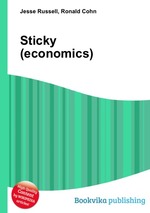Sticky (economics)
Jesse Russell Ronald Cohn
бумажная книга
High Quality Content by WIKIPEDIA articles! Sticky, in the social sciences and particularly economics, describes a situation in which a variable is resistant to change. Sticky prices are an important part of macroeconomic theory since they may be used to explain why markets might not reach equilibrium in the short run or even possibly the long-run. Nominal wages may also be sticky. Market forces may reduce the real value of labour in an industry, but wages will tend to remain at previous levels in the short run. This can be due to institutional factors such as price regulations, legal contractual commitments (e.g. office leases and employment contracts), labour unions, human stubbornness, human needs, or self-interest. Stickiness may apply in one direction. For example, a variable that is "sticky downward" will be reluctant to drop even if conditions dictate that it should. However, in the long run it will drop to the equilibrium level.


